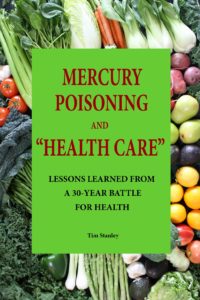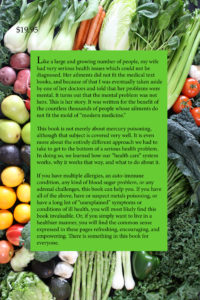 The purpose of this book is to share information—to share something of what we have learned about caring for ourselves and for our family with the hope that it may be helpful to others. To do this, I will tell you the story of my wife’s thirty-year battle with mercury poisoning. The details of her story are unique because we are all different, but the principles behind her return to health are the same principles behind a potential return to health for countless other people.
The purpose of this book is to share information—to share something of what we have learned about caring for ourselves and for our family with the hope that it may be helpful to others. To do this, I will tell you the story of my wife’s thirty-year battle with mercury poisoning. The details of her story are unique because we are all different, but the principles behind her return to health are the same principles behind a potential return to health for countless other people.
My wife, Deborah, is not a rare case. She is only one of a large and ever increasing number of people whom our medical system cannot help. Had we followed the advice of her doctors, Deborah could long ago have been institutionalized and become yet another drugged-up, personality-void, waif pining away in some mental ward. Thank God, she has been anything but that! In the midst of her adversity, she did a wonderful job raising our children, has since had a successful career, and has been an inspiration to many.
From the time we discovered Deborah’s mercury problem, we have been asked many times, “How do you get mercury poisoning?” The answer is not so simple. Every time we tried to answer this question, we felt that our short answers were not only woefully inadequate, but in fact missed the mark. The reason is that any short answer to the question will almost invariably be hung on a faulty framework of understanding. In most cases, the better question is: How can we keep exposure to mercury from becoming mercury poisoning?
In the process of solving Deborah’s health problems, we found out that the accumulation of metals in the body can be a major underlying component of ill health and disease. But it is not that simple. There are other major factors as well. We also found out that there are enormous conflicts of interest when it comes to what is called “health care” rendering an enormous amount of it useless, if not downright harmful. 
I originally intended to merely tell Deborah’s story and to list resources where the reader could find additional practical information on mercury poisoning and related matters. However, in the process of doing my research and compiling the book, I did not find any single source, or even a collection of several sources, that covered the subject close to adequately. I realized that if I stayed with my first intent, the amount of time it would take the reader to get a good overview of the subject matter would be unacceptable. So, I set out to write the most helpful book on the subject that I could, and that is why the book is in the form in which you have it.
The book does three things: It tells our story, it gives comments on the lessons we learned, and it provides backup information in the form of references, notes, and resources which enable the reader to expand his or her own investigation.
Deborah’s story and the stories of some of the other people I will tell you about put a human face on the widespread, if not prevailing, condition of ill health in the US population, and shows how we can be delivered from it. What we want to address is this: How did we get into this condition of ill health, and what is our way back to wellness?
Regardless of where you are in the pursuit of healthy living—whether you are a novice or someone who has been earnest in the endeavor for decades—there is something in this book for you. If you have allergies, blood sugar problems, adrenal or thyroid problems, recurrent infections, any autoimmune condition, a bipolar condition or any mental instability, Parkinson’s, MS, or if after describing your symptoms your doctor told you, “I’ve never heard of that before,” this book could be invaluable to you. If you have young children, I know of no better example of how to care for them than that of my wife.
Sometimes our health challenges are overwhelming. But if we get on the right track, we have a good chance of arriving at better health and getting away from “health care” that isn’t. By telling Deborah’s story, it is our hope that many people will be encouraged and empowered to embark on precisely that kind of journey of discovery.
We humbly offer what we have learned.
Tim and Deborah Stanley